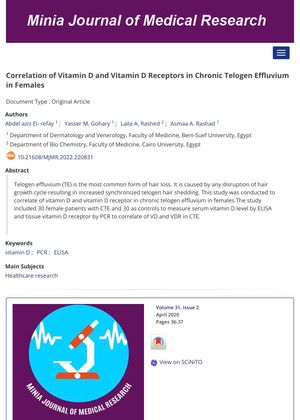TLDR Low Vitamin D and its receptors might be linked to chronic hair loss in women.
The study, conducted three years ago, investigated the correlation between Vitamin D and Vitamin D receptors in chronic telogen effluvium (CTE), a common form of hair loss, in females. The research included 30 female patients with CTE and 30 control subjects. The researchers measured serum Vitamin D levels using ELISA and tissue Vitamin D receptor levels using PCR. The aim was to establish a correlation between Vitamin D and Vitamin D receptors in CTE.
 4 citations
,
August 2013 in “Expert Review of Dermatology”
4 citations
,
August 2013 in “Expert Review of Dermatology” Updated treatments for female hair loss include minoxidil, antiandrogens, hair transplants, and light therapy.
2 citations
,
December 2018 in “Қазақстанның клиникалық медицинасы” Higher Vitamin-D levels may help treat certain types of hair loss.
 32 citations
,
December 2017 in “International Journal of Molecular Sciences”
32 citations
,
December 2017 in “International Journal of Molecular Sciences” Low vitamin D might be linked to certain types of hair loss, and supplements could help, but more research is needed.
 June 2024 in “Archives of dermatological research”
June 2024 in “Archives of dermatological research” Dietary supplements might help prevent post-COVID hair loss, but serum ferritin is not a reliable indicator.
 9 citations
,
November 2014 in “Journal of Cutaneous Medicine and Surgery”
9 citations
,
November 2014 in “Journal of Cutaneous Medicine and Surgery” Many dermatologists in Saudi Arabia recommend vitamins and minerals for hair loss, often based on personal experience rather than strong evidence.




